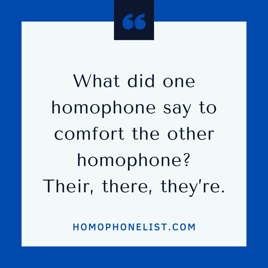 If you’ve wondered whether someone created these often-confused words just to torture English-speaking people, you’re not alone.
If you’ve wondered whether someone created these often-confused words just to torture English-speaking people, you’re not alone.
“Their,” “there,” and “they’re” are:
- Pronounced the same.
- Spelled similarly (the first three letters are identical).
- Confused by Spell Check—four times as I wrote this blog post, for example.
- Used incorrectly in the wild all the time. (If you read a mistake often enough, or only ever hear/see a grammar mistake, you may just think it’s correct. This happened to me while growing up with home vs. hone, towards vs. toward, and chomping vs. champing.)
To sum up: We’re screwed.
I’m kidding. Let’s take about three minutes to rewire your brain so you never struggle with using “their,” “there,” and “they’re” correctly again.
How to Use and Spell “Their”
“Their” is a possessive pronoun. A pronoun is just a replacement word for the name of something. Instead of “Billy and Betty,” we say “they.” And if something belongs to Billy and Betty, we use the word “their” before it, instead of “Billy and Betty’s.”
- Spelling Tip: Think of “heir,” as in “Gregory was the sole heir to his father’s fortune.” Something belongs to an “heir.”
- Word Type: Possessive pronoun
- Examples:
- I’m never talking to their dog again; he’s so rude.
- That’s fair, but what about chatting up their chinchilla?
- Unfortunately, their chinchilla only speaks Portuguese.
How to Use and Spell “There”
“There” is all over the place, sometimes literally, sometimes figuratively. In other words: It can be used to mean many things and in many different ways in a sentence. It’s most commonly used to refer to a place. And it’s sometimes an idiom used to comfort a person, as in, “There, there, don’t cry just because you spelled ‘there’ wrong for the twentieth time in a row.”
- Spelling Tip: Think of similar words: here, there, everywhere. Follow the lead of “ere.”
- Word Type: It would take all day to list them; even Merriam Webster agrees.
- Examples:
- The mall? We went there last week to buy feather boas.
- Hi there. My name is Adelaide, and I’m a Portuguese-speaking chinchilla. (This sentence has been translated to English.)
- He’s always been there for me, through thick and thin… and even Jell-O.
How to Use and Spell “They’re”
“They’re” is like “can’t”—a mashup of two words (“they” and “are”), with one or more letters pulled out so we can save .0034 seconds while we speak. The high-flying comma, or apostrophe, is used to indicate the missing letters/mashup.
- Spelling Tip: You can never go wrong by thinking of the words separately and then smashing them together like a word sandwich in your brain: “they” + “are” = “they’re.”
- Word Type: A contraction of the subject pronoun “they” and the present tense verb of “to be,” “are.”
- Examples:
- See those chinchillas? They’re speaking in sign language and Portuguese, with a smattering of Russian swear words.
- I think they’re hilarious when they swear, but their owner doesn’t agree.
- They’re the most endearing chinchillas I’ve ever met, despite their potty mouths.
Does that clear things up?
If you have specific questions about the usage of “their,” “there,” and “they’re,” we’re happy to help! Comment below. And feel free to share the most hilarious misspellings you’ve seen of “their,” “there,” and “they’re” with us.
*****
Thanks for reading! We post a new writing guide, spelling quiz, or grammar tip every other week. Be sure to subscribe to our email updates to get them delivered to your inbox. Use the search bar at the top-right of our blog to learn more about specific topics.
Can’t find answers to a grammatical head-scratcher that’s driving you batty? Post a comment below or submit a question directly to our grammar experts. We may even create a new resource or blog post with the answer!



